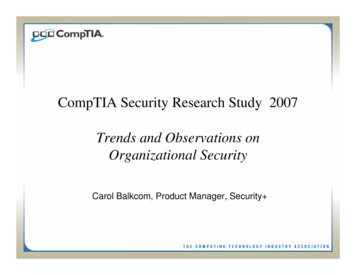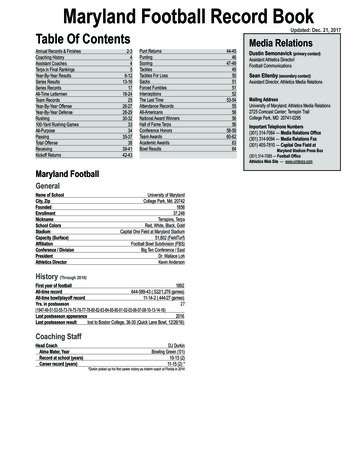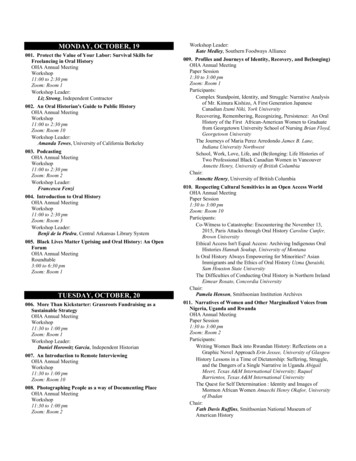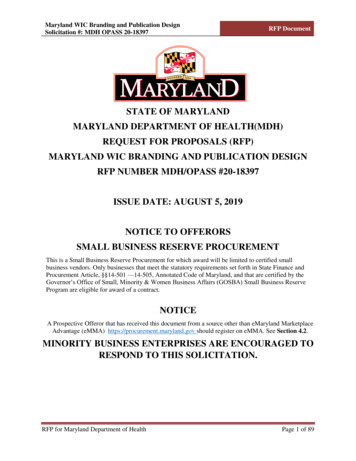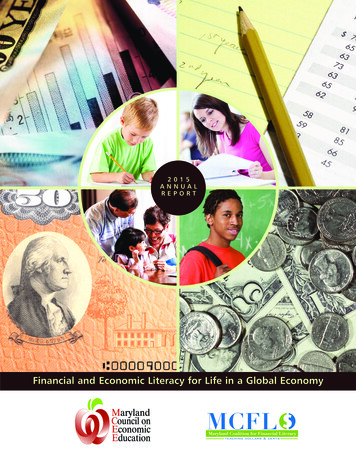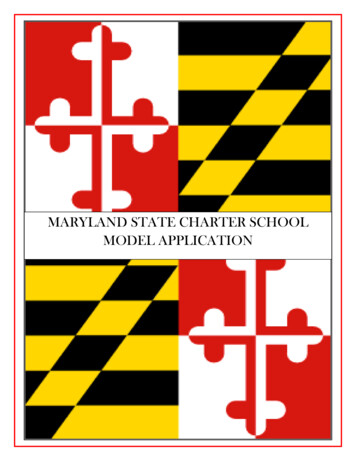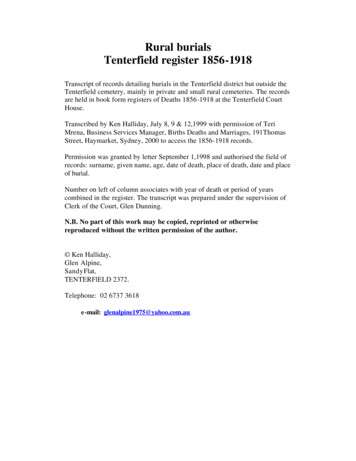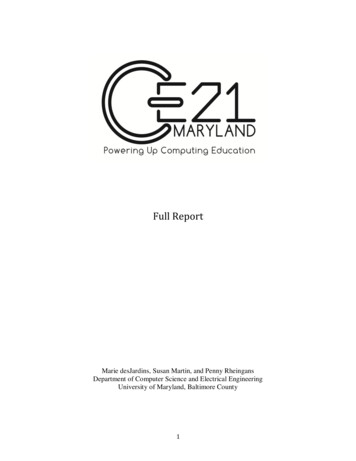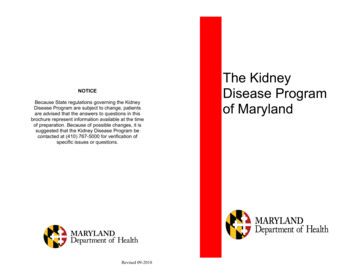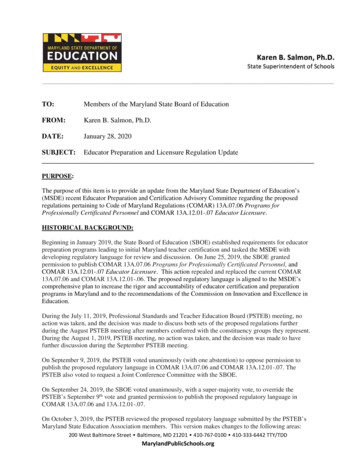
Transcription
TO:Members of the Maryland State Board of EducationFROM:Karen B. Salmon, Ph.D.DATE:January 28, 2020SUBJECT: Educator Preparation and Licensure Regulation UpdatePURPOSE:The purpose of this item is to provide an update from the Maryland State Department of Education’s(MSDE) recent Educator Preparation and Certification Advisory Committee regarding the proposedregulations pertaining to Code of Maryland Regulations (COMAR) 13A.07.06 Programs forProfessionally Certificated Personnel and COMAR 13A.12.01-.07 Educator Licensure.HISTORICAL BACKGROUND:Beginning in January 2019, the State Board of Education (SBOE) established requirements for educatorpreparation programs leading to initial Maryland teacher certification and tasked the MSDE withdeveloping regulatory language for review and discussion. On June 25, 2019, the SBOE grantedpermission to publish COMAR 13A.07.06 Programs for Professionally Certificated Personnel, andCOMAR 13A.12.01-.07 Educator Licensure. This action repealed and replaced the current COMAR13A.07.06 and COMAR 13A.12.01-.06. The proposed regulatory language is aligned to the MSDE’scomprehensive plan to increase the rigor and accountability of educator certification and preparationprograms in Maryland and to the recommendations of the Commission on Innovation and Excellence inEducation.During the July 11, 2019, Professional Standards and Teacher Education Board (PSTEB) meeting, noaction was taken, and the decision was made to discuss both sets of the proposed regulations furtherduring the August PSTEB meeting after members conferred with the constituency groups they represent.During the August 1, 2019, PSTEB meeting, no action was taken, and the decision was made to havefurther discussion during the September PSTEB meeting.On September 9, 2019, the PSTEB voted unanimously (with one abstention) to oppose permission topublish the proposed regulatory language in COMAR 13A.07.06 and COMAR 13A.12.01-.07. ThePSTEB also voted to request a Joint Conference Committee with the SBOE.On September 24, 2019, the SBOE voted unanimously, with a super-majority vote, to override thePSTEB’s September 9th vote and granted permission to publish the proposed regulatory language inCOMAR 13A.07.06 and 13A.12.01-.07.On October 3, 2019, the PSTEB reviewed the proposed regulatory language submitted by the PSTEB’sMaryland State Education Association members. This version makes changes to the following areas:200 West Baltimore Street Baltimore, MD 21201 410-767-0100 410-333-6442 TTY/TDDMarylandPublicSchools.org
Members of the Maryland State Board of EducationJanuary 28, 20202 Page Definitions;Types of educator licenses;Adds literacy and math coursework as an alternative to presenting a passing score on a Basicskills test;Performance Review Route to licensure;Approval of Individual Professional Development Plans; andAssignment.The PSTEB members revised the proposed regulatory language and made further changes to the types ofteacher licenses [COMAR 13A.12.02.02A(2)-(4)], adding a Master Professional License.On October 22, 2019, the SBOE considered the proposed changes presented by the PSTEB and chose tocontinue discussion at its December 3, 2019, meeting.On December 3, 2019, the SBOE continued its discussion and rescinded permission to publish COMAR13A.07.06 Programs for Professionally Certificated Personnel and COMAR 13A.12.01-.07 EducatorLicensure. During that meeting, Dr. Salmon indicated that the MSDE would present the concernspertaining to the regulations to the Educator Preparation and Certification Advisory Committee for reviewand discussion.The Advisory Committee met on December 11, 2019, to review COMAR 13A.07.06 Programs forProfessionally Certificated Personnel. Topics discussed included: Content Standards and Maryland Competencies; Clinical Internship; Program credit hour requirements; and edTPA for individuals in dual enrollment programs.The Advisory Committee met on January 22, 2020, to review COMAR 13A.12.01-.07 EducatorLicensure. Discussion topics included: Master’s Degree; Renewal Requirements; and Basic Skills Assessment.EXECUTIVE SUMMARY:This update provides information regarding the discussions and recommendations from the EducatorPreparation and Certification Advisory Committee.ACTION:For discussion only.Attachments:KBS: sdsPowerPoint Presentation
Educator Preparation andLicensure: Regulatory UpdateSTATE BOARD MEETINGJanuary 28, 2020
BackgroundJune 2016-October 2017: Teacher Induction, Retention, and Advancement Act Workgroup Over 70 stakeholders representing higher education, teacher unions, and preK-12 communities Recommendations focused on: Standards and accountability for educator preparation programs in MarylandLicensure of Maryland educatorsMentoring and professional development for current teachersDecember 2017-April 2018: State Board of Education (SBOE) Teacher Preparation/ Certification Subcommittee The subcommittee was established in response to the recommendations from the TIRA workgroup and to ensurealignment to the Commission on Innovation and Excellence in Education (Kirwan Commission) recommendations. Subcommittee recommendations: 2Increase the rigor of educator preparation programs Standardize entrance and exit requirements Establish content standards and competenciesExtend and professionalize the clinical internshipAdopt rigorous educator assessments (content/performance-based) as a certification requirementDevelop an accountability system for Maryland’s educator preparation programs that utilize multiplemeasures
Background ContinuedSeptember 2016-November 2019: Commission on Innovation and Excellence in EducationElement 2a: Teacher Preparation will be much more rigorous and induction will be integrated with teacher preparationmore systematically.Element 2b: Raise standards for licensing new teachers in Maryland to levels comparable to the standards for teachers inthe top-performing nations.October 2018 - Present: SBOE and Professional Standards and Teacher Education Board (PSTEB) members continued todiscuss changes to the educator preparation and certification regulations Regulatory language has been aligned to each of the design assumptions identified by the Kirwan Commission asnecessary for achieving Elements 2a and 2b. Each major topic was presented and discussed by both boards prior to granting MSDE permission to proceed withwriting the regulations. (see attachment A) Significant differences and proposed language changes between the boards were included in presentations to bothboards.June 2019- Present: Superintendents' Educator Preparation/Certification Advisory Committee3
Educator Preparation and CertificationAdvisory CommitteeAdvisory Committee Purpose Engage in discussion and solicit feedback pertaining to the implementation of MSDE policies related to the newregulations14 Members 1 Alternative Preparation Community representative6 Local School System (LSS) members representing superintendents, certification partners, and human resourceofficers Calvert County, Dorchester County, Frederick County, Montgomery County, St. Mary’s County6 Institutions of Higher Education representatives Community College of Baltimore County, Loyola University Maryland, Morgan State University, Mount St.Mary’s University, Towson University, University of Maryland College Park1 Nonpublic School representative2 MSDE staffMeetings Focused on Proposed Regulations 4December 11, 2019, and January 22, 2020
Educator Preparation RegulationsExpressed Concerns5 National Content Standards and MarylandCompetencies: Regulations will need to beamended each time the national standardsare updated or revised. Competencies fromunattributed sources, some of which areoffensive. Clinical Experience Requirements: Tooprescriptive when the clinical experienceoccurs and does not allow flexibility todesign practicum experiences aligned toprograms. Educator Preparation Programs(EPPs) have “serious concerns” with theyear-long practicum requirement Credit Requirements: Two new courserequirements have been added andregulations establish a standard credit hourcap of 120 hours. This requirement mayconflict with Maryland Higher EducationCommission (MHEC) regulations. Assessment/Dual Enrollment: With theadoption of a performance assessment,there is concern candidates will need toparticipate in two versions of the edTPA ifthat assessment is chosen (in lieu of PPAT).
Standards and CompetenciesAdvisory Committee RecommendationsAlign the national content standards by placing all likestandards under subject headings (math, science, etc.).MSDE RecommendationsConcurAssure all national content standards are still current andcomprehensive.Concur. Added Computer Science Standards, Common CoreState Standards for English Language Arts, NASM MusicStandards, National Core Arts Standards, American LibraryAssociation, American School Counselor Association, and WIDAEnglish Development Standards for TESOL and ELLGroup literacy and cultural competencies into larger headingsso they do not read like a checklist.Concur. Reformatted literacy competencies into four clustersaligned to MSDE framework which mirrors Certification. Alsoadded the word “select or” to Literacy Assessment 3b.Reformatted Cultural Competencies into six clusters.Removed three General Competencies that were overlappingand relocated three to better aligned group.Use the advisory committee to review the rubrics and toolsused for demonstration of compliance with the standards andcompetencies.6Concur
Clinical InternshipAdvisory Committee RecommendationsMSDE RecommendationsAssure all references to the internship reads, “yearlong toinclude the beginning of the school year” and that placementcan be in LSS, Nonpublic Schools, or State Operated programs.Concur. All regulatory citations were reviewed and languagewas aligned. Added “nonpublic” to “alternative program”definition and added “State-operated and nonpublic school” to“Local School System” and “Professional Development School”definitions.Committee members agreed action research is a currentrequirement and needs to remain a requirement. LSSs andIHEs need to continue to collaborate to ensure action researchis occurring.ConcurThe IHEs would like to be able to continue to place teachercandidates outside of Maryland.Disagree. EPPs are preparing candidates for Marylandlicensure. Candidates should receive training utilizing Marylandcurriculum standards. Maryland placements are also anopportunity future employment in Maryland LSSs.Regulatory language pertaining to the pre-practicumexperiences is too restrictive by requiring alignment withlicensure area being sought.Concur. Regulatory language was removed specifyingalignment two grade and subject area. Internship placementsare still required to be aligned with grade and subject-area forwhich licensure is sought.7
Clinical InternshipAdvisory Committee RecommendationsCandidates should be responsible for the instruction andmanagement of the classroom for a minimum of 150 hoursduring the clinical internship.8MSDE RecommendationsConcur. Language amended to require 150 hours instead of100 hours. Requiring a minimum number of hours rather thandays allows for better flexibility during the internship.
Credit Hour RequirementsAdvisory Committee RecommendationsMHEC is currently working with their AG to determine ifMSDE’s language is sufficient to comply with their regulationsand if their regulations need to be changed based on theKirwan Commission recommendations.MSDE RecommendationsThe MSDE had already amended language to include, “unlessotherwise permitted by law.” EPPs are encouraged to becreative in designing programs, to eliminate courses that areredundant or extraneous.Performance Assessment and Dual EnrollmentAdvisory Committee RecommendationsMSDE RecommendationsFor those individuals who are seeking dual certification (i.e.,elementary/special education) candidates shall take the edTPAassessment aligned with their internship placementConcur9
Miscellaneous Recommendations and ChangesAdvisory Committee RecommendationsMSDE RecommendationsApproval Cycle: Change language from a 5-year to a 7-yearcycle to align with the current Council for the Accreditation ofEducator Preparation (CAEP) review cycle.Disagree. Education Article 11-208 was amended in 2017;EPPs choose state approval or accreditation. Five-year cyclealigns with the alternative preparation review cycle, producingmore accountability and program feedback.Remove language requiring teacher performance data in theprogram reporting requirements since this data is not allowedto be collected.Concur. Language has been removed.DefinitionsRemoved the definitions for “Interstate Certification Compact”and “Self Study Report” because these terms are not found inthe regulations.10
Licensure RegulationsExpressed ConcernsRemoval of an AdvancedCredential: Elimination of themaster’s degree is loweringstandards.Renewal Requirements: The ProfessionalDevelopment Points are too prescriptiveand onerous as they require the approvalof the principal.Basic Skills: An alternative measure (coursework) shouldbe provided to potential teacher candidates todemonstrate mastery on a Basic Skills assessment due tothe number of individuals that struggle to pass thisrequired assessment.11
Licensure RecommendationsAdvisory Committee RecommendationsDiscontinue Advance Professional CertificateMSDE RecommendationsConcur. The relationship between teacher education level andstudent performance is not significant enough to support thecontinuance of requiring an advanced degree license.Renewal Requirements: Professional Development Points areappropriate and involvement of a supervisor is appropriate.Allow a broader range of supervisors to monitor/approve theprofessional development plan rather than only a “directsupervisor”.Concur. Language amended pertaining to supervisor andestablishing a minimum number of professional developmentpoints for a given activity. (e.g., up to 30 points rather than 30points for designing curriculumBasic Skills: The current measures in place for basic skillsmastery (Praxis Core, SAT, GRE, ACT, 3.0 GPA) are sufficient. Nocourse option should be added.Concur.12
Miscellaneous Licensure RecommendationsAdvisory Committee RecommendationsMSDE RecommendationsNational Board Certification (NBC): Add language to therenewal requirements to ensure educators know that the NBCmay be used toward the renewal of the Maryland EducatorLicense.Concur. Added language in the Professional DevelopmentPoints section of chapters 2-5. It is important to note thatsome areas of certification include additional renewalrequirements that may not be met by solely by achieving NBC(e.g., school counseling, blind/visually impaired, administratorswho are employed)Amend language in Individual Professional Development Planto clarify that only 90 points are required regardless of thenumber of licensure areas one holds.Disagree. The proposed definition of “license” means aneducator credential issued by the Department, which allows theholder to practice the area(s) of licensure noted. Clarifyinglanguage is not required.13
Questions14
Attachment 2.19Summary of Meetings at the SBOE and PSTEB Regarding Proposed Regulatory TopicsRegulatory TopicTIRA Workgroup ReportAction Plan for Certification and EducatorPreparation ProgramsSBOE Subcommittee Report on Certification andEducator Preparation ProgramsAction plan for Certification and EducatorPreparation UpdatePathways to Obtain a MD CertificatePresentationEPP: Standards and Competencies PresentationOut of State Pathways to obtain a MD LicensePresentationLicense Types and Renewal PresentationOut of State Pathways to Obtain a MD LicenseRegulationsEducation Preparation Program RequirementsRegulationsEducator Licensure AssessmentsEducator Preparation Program RequirementsRegulationsTeacher Licensure Regulations5.21.196.6.19Suspension and Revocation: Educator LicensureRegulationsProfessionally Certificated PersonnelRegulations (Educator Preparation Programs)Education Licensure: Specialists5.21.196.6.19Education Licensure: 2.3.197.11.198.1.199.9.1910.3.1911.7.19Education Licensure: Professional and TechnicalEducation and Specialized Areas of Fine ArtsRegulationsPermission to Publish Regulations forProfessionally Certificated Personnel5.21.196.6.19CommentRevise IPC, MD Standards to replace IPC, Changes to InternshipCertification RegulationsEducator Preparation ProgramEntrance/Exit Requirements, Standards and Competencies, Internship, Licensure Assessments, andAccountability SystemCertification RegulationsEducator Preparation ProgramThe 12.8.18 SBOE presentation contained the areas that PSTEB did not approve during their 12.6.18 meeting.1.3.19 PSTEB presentation contained SBOE decisions regarding pathwaysEntrance/Exit Requirements, Clinical Experience Standards/Competencies: general, elementary/secondaryliteracy, math, ethics, cultural, teacher evaluationSBOE presentation contained PSTEBs recommendations. SBOE voted to grant permission for the pathway thatPSTEB did not approve.License Types (removal of Advanced License and Master’s degree requirement)Renewal Requirements (Professional Development Points)Proposed regulations were presented for discussion only based on the previous month’s discussions.Both the SBOE in Jan. and PSTEB in Feb. granted MSDE permission to move forward with proposed regulatorylanguage based on presentation discussions. Topics: entry/exit requirements, standards/competencies, andclinical experiencesSBOE considered Educator Licensure Assessments (Basic Skills, Content, and Pedagogy) PSTEB ran out of timefor this update at their May meetingTopics included purpose and scope, definitions, approval process, review and renewal, oversight andrevocation.Topics included assignment, types of licenses, pathways to initial licensure, additional teaching endorsements,renewal of a teacher license, individual professional development plans, and professional development pointsTopics included definitions, causes, reporting procedures, denial, hearing procedures, record of hearing,decisions, reconsideration of a decision, and reinstatementTopics included entrance/exit requirements, standards and competencies, clinical experiences, approvalprocess, program approval status and requirements, reporting requirements, and revocation procedures.Topics: purpose, licenses types, specialist areas, license renewal, Individual Professional Development Plans,and Professional Development PointsTopics: purpose, licenses types, administrator areas, license renewal, Individual Professional Developmentplans, and Professional Development PointsTopics: purpose, licenses and pathways, renewal, Individual Professional Development Plans, ProfessionalDevelopment Points, and additional licensesFull set of regulations presented for permission to publish
Attachment 0.3.1911.7.19Summary of Meetings at the SBOE and PSTEB Regarding Proposed Regulatory TopicsPermission to Publish Regulations for EducatorLicensureFull set of regulations presented for permission to publish. Shared PSTEBs proposed language changespertaining to Professional Development Points discussed at the May PSTEB meeting with SBOE forconsideration. SBOE kept the current language. Shared PSTEBs plan to discuss the Master’s degree at theirnext meeting.
Chapter 06 Programs for Professionally Certified PersonnelAuthority: Education Article, §§2-205 and 6-704, Annotated Code of Maryland.01 Purpose.A. This chapter sets the standards that MSDE uses to issue an approval document to an entity that isresponsible for governing and operating an educator preparation program, either traditional oralternative, for the training of educators to be licensed in the State.02 Definitions.A. In this chapter, the following terms have the meanings indicated.B. Terms Defined.(1) “Accreditation”, also referred to as "national accreditation," means a teacher educationprogram has met standards set by a national accrediting agency recognized by the Department and theCommission.(2) “Action Research” means a deliberate, solution-oriented investigation to enhance studentachievement that is conducted by the teacher candidate, under the guidance of a supervising teacher andclinical faculty.(3) “Alternative Program” means a program provided by any public, nonpublic or privateeducational association, local school system, corporation or institution that includes coursework,assessment, clinical experiences and training, and, upon completion, renders candidates eligible forlicensure in Maryland, but does not confer a degree.(4) “Approval” means a program has met all requirements set by the Department.(5) “Approval with Conditions” means a program has met some, but not all, requirements set by theDepartment and may operate under certain conditions.(6) “Candidate” means an individual enrolled in an educator preparation program who ispreparing for or serving in a position as an educator in schools that educate students in preschoolthrough grade twelve.(7) “Clinical Experience” means guided, hands-on, practical applications and demonstrations of acandidate’s professional knowledge and the application of theory through collaborative and facilitatedlearning in field-based assignments, tasks, activities, and assessments across a variety of settings.(8) “Clinical Supervisor” means a supervisor of a candidate who is employed by the educationpreparation provider, trained or experienced in the field in which the individual is supervising, and istrained to work with and provide feedback to candidates.(9) “Commission” means the Maryland Higher Education Commission.(10) “Department” means the Maryland State Department of Education.(11) “Educator Preparation Program (Program)” means a Maryland approved program, eithertraditional or alternative that offers a sequence of courses and experiences required by an educationpreparation provider for the preparation of candidates to become educators in a specific area, subject, orcategory.(12) “Educator Preparation Provider (Provider)” means a regionally accredited college, university,or other post-secondary institution, public or private educational association, local school system,corporation or institution approved to operate a traditional or alternative educator preparation programin the State of Maryland.(13) “Entrance” means matriculation into a program.(14) “Exit” means completion of a program.(15) “Focused Revisit” means the subsequent review by the Department of a program that holds thestatus of approved with conditions or probation.[(16) "Interstate Certification Compact (ICC)" means a legal agreement with other states tofacilitate the certification of out-of-state teachers and other professional educational personnel as1
authorized by Education Article, Title 6, Subtitle 6, Annotated Code of Maryland, or as otherwiseprovided by law.][(17)] (16) “Local School System (LSS)” means a Maryland public school system [, a State-operatedschool, or a nonpublic school].[(18)] (17) “Maryland Teacher-Principal Evaluation” means an evaluation framework for theperformance of teachers administered annually by the local school system, a State-operated school, or anonpublic school, and recommended by the State.[(19)] (18) “Partner School” means a school selected by a college or university with which tocollaborate in order to provide a geographically preferable location or to meet a subject area need inwhich a candidate may be placed for their clinical experience in order to prepare teacher candidatesacross all clinical experiences.[(20)] (19) “Probation” means a program has seriously failed to meet program requirements or hasdemonstrated a pattern of noncompliance.[(21)](20) “Professional Development” means a variety of specialized training, formal education, oradvanced professional learning intended to help administrators, teachers, and other educators improvetheir professional knowledge, competence, skill, and effectiveness.[(22)](21) “Professional Development School” means a collaboratively planned and implementedpartnership for the academic and clinical preparation of candidates and the continuous professionaldevelopment of both school system and provider faculty, implemented through a memorandum ofunderstanding between the local school system, a State-operated school, or a nonpublic school, and theProvider.[(23)](22) “Satisfactory Progress” means a teacher candidate is on track to satisfy all programrequirements within the required timeframe established by the provider.[(24)“Self-Study Report” means the report resulting from the process that a provider and itsprograms conduct to evaluate themselves against national standards, in a format specified and acceptedby the Department.][(25)] (23) “Traditional Program” means:(a) An educator preparation program offered by a college or university leading to a degree[,] thatincludes:(i) General education and content coursework;(ii) Professional coursework;(iii) Clinical experiences; and(iv) Demonstration of standards and competencies required to prepare educators for teachingstudents in the classroom environment; and(b) Upon completion, renders candidates eligible for licensure in Maryland.03 Incorporation by Reference.In this chapter, the following documents are incorporated by reference:A. National Standards.[(1) Standards for School-Based Agricultural Education Teacher Preparation Programs, AmericanAssociation for Agricultural Education (AAAE), 2017.][(2) Accreditation Documents For Undergraduate Programs In Family And Consumer Sciences,American Association of Family and Consumer Sciences (AAFCS), 2010.][(3) Standards Framework for Learners, American Association of School Librarians (AASL), 2017.][(4) ACTFL/CAEP Program Standards for the Preparation of Foreign Language Teachers,American Council on the Teaching of Foreign Languages (ACTFL)/ Council for the Accreditation ofEducator Preparation (CAEP), 2013.][(5) Standards for Learning American Sign Language: A Project of the American Sign LanguageTeachers Association, American Sign Language Teachers Association (ASLTA), 2018.][(6) Association for Childhood Education International, Elementary Education Standards andSupporting Explanation, 2007; Council for the Accreditation of Educator Preparation (CAEP), 2018.]2
[(7) Middle Level Teacher Preparation Standards with Rubrics and Supporting Explanations,Association for Middle Level Education (AMLE), 2012.][(8) Introduction to the 2016 CACREP Standards, Council for Accreditation of Counseling &Related Educational Programs (CACREP), 2016.][(9) Initial Preparation Standards, Council for Exceptional Children (CEC), 2015.][(10) NAGC – CEC Teacher Preparation Standards in Gifted and Talented Education, NationalAssociation for Gifted Children (NAGC) - Gifted and Talented Specialist: Council for ExceptionalChildren (CEC); The Association for the Gifted (TAG), 2018.][(11) Standards for the Preparation of Literacy Professionals, International Literacy Association(ILA) Standards for the Preparation of Literacy Professional, (2017).][(12) Standards for Educators, International Society for Technology in Education (ISTE), 2019.][(13) Model Core Teaching Standards and Learning Progressions for Teachers 1.0 , InterstateTeacher Assessment and Support Consortium (InTASC), 2013.][(14) Standards for Art Teacher Preparation, National Art Education Association (NAEA), 2014.][(15) Standards for Initial Early Childhood Professional Preparation, National Association for theEducation of Young Children (NAEYC), 2010.][(16) Competencies Summary, National Association of Schools of Theater (NAST), 2019.][(17) Standards for Graduate Preparation of School Psychologists, National Association of SchoolPsychologists (NASP), 2010.][(18) Standards for School Social Work Services, National Association of Social Workers (NASW),2012.][(19) Business Teacher Education Curriculum Guide and Program Standards, National BusinessEducation Association (NBEA), 2013.][(20) National Standards for the Preparation of Social Studies Teachers, National Council for SocialStudies (NCSS), 2018.][(21) NCTE/NCATE Standards for Initial Preparation of Teachers of Secondary English LanguageArts, Grades 7-12, National Council of Teachers of English (NCTE) )/National Council for theAccreditation of Teacher Education (NCATE), 2012.][(22) Standards for Mathematics Teacher Preparation, National Council of Teachers of Math(NCTM), 2012.][(23) Program Recognition Standards: District Level, National Educational Leadership Preparation(NELP), 2018.][(24) Standards for Science Teacher Preparation, National Science Teachers Association (NSTA),2020.][(25) Disciplinary Core Ideas (DCI) Arrangements of the Next Generation Science Standards, NextGeneration Science Standards (NGSS), 2013.][(26) Professional Standards for Educational Leaders, Professional Standards for EducationalLeaders (PSEL), 2015.][(27) National Standards for Initial Physical Education Teacher Education, Society of Health andPhysical Educators (SHAPE), 2017.][(28) National Standards for Initial Health Education Teacher Education, Society of Health andPhysical Educators (SHAPE), 2018.][(29) Standards for Mathematical Practice, Common Core State Standards Initiative, 2012.][(30) Standards for Initial TESOL Pre-K–12 Teacher Preparation Programs, Teaching English toSpeakers of Other Languages (TESOL), 2018.][(31) National Association of Schools of Music, Handbook 2018-19, 2019.][(32) Standards for Computer Science Educators, International Society for Technology in Education(ISTE), 2019.][B. Model Code o
200 West Baltimore Street Baltimore, MD 21201 410-767-0100 410-333-6442 TTY/TDD MarylandPublicSchools.org TO: Members of the Maryland State Board of Education FROM: Karen B. Salmon, Ph.D. DATE: January 28, 2020 SUBJECT: Educator Preparation and Licensure Regulation Update PURPOSE: The purpose of this item is to provide an update from the Maryland State Department of Education's



